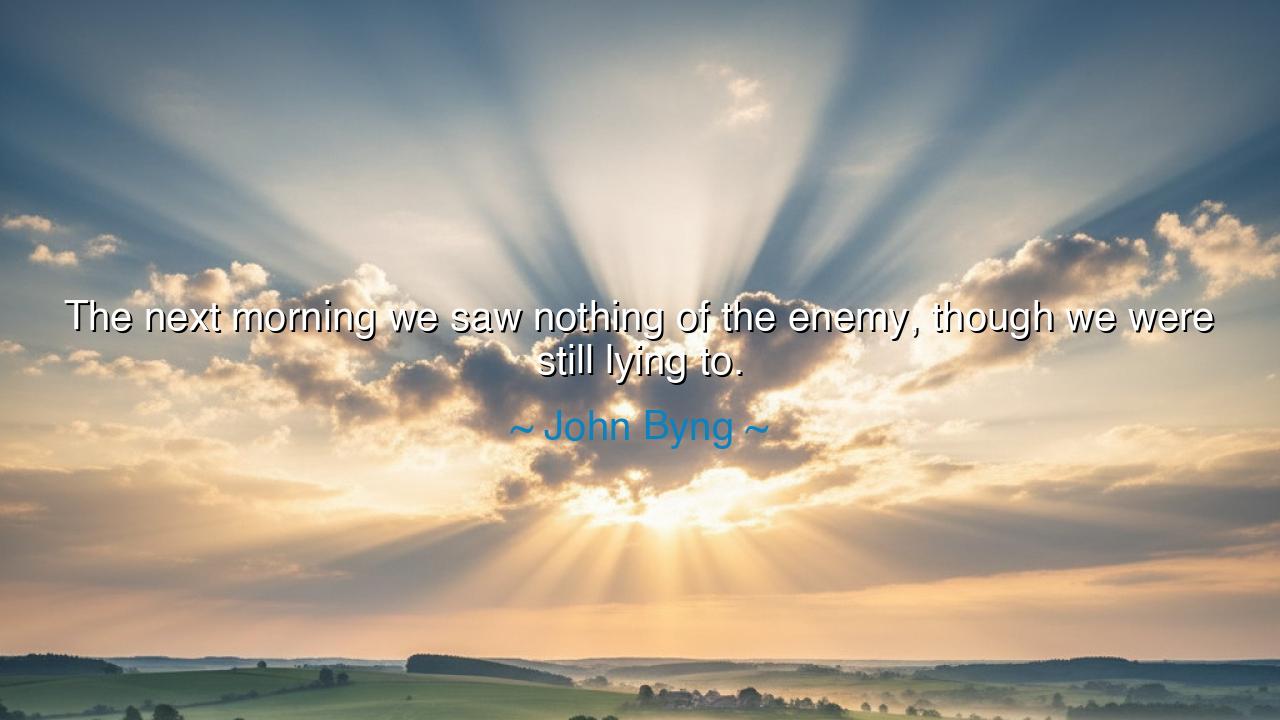
The next morning we saw nothing of the enemy, though we were






"The next morning we saw nothing of the enemy, though we were still lying to." — John Byng. These words, spoken by John Byng, reveal a deeper truth about the nature of battle, strategy, and the uncertainty of conflict. In this brief reflection, Byng encapsulates the essence of many military engagements—the anticipation, the tension, and the unpredictable ebb and flow of war. Here, the enemy is absent, perhaps retreating or hiding, but the soldiers remain in their positions, uncertain of what lies ahead. Their strategy has brought them to this moment, but the outcome remains unclear, and all they can do is wait, still lying in readiness, prepared for whatever may come.
In the ancient world, military strategy was an art that demanded not only strength but patience and wisdom. Consider the Battle of Marathon, where the Athenian army, outnumbered by the Persians, awaited the right moment to strike. The Athenians, though faced with great uncertainty, did not rush into battle but waited for the perfect time to engage. Their discipline and foresight were the keys to their success. Much like Byng's words, the soldiers lay in wait, knowing that battle is often decided not by immediate action, but by timing, strategy, and the quiet resolve to endure until the moment of reckoning arrives.
Think, too, of the ancient tale of Hannibal, the Carthaginian general who crossed the Alps to face the Romans in the Second Punic War. Hannibal’s strategy was one of patience and deception, keeping the Romans uncertain of his true movements. At the Battle of Cannae, Hannibal surrounded the Romans, luring them into a trap. In a similar way, Byng’s words reflect the uncertainty of battle: you may think you know your enemy’s next move, but in war, the outcome is often shaped by what is unseen, by what is hidden in the waiting. Hannibal’s success came not only from his military skill but from his ability to outlast and outwit his opponents, much like the soldiers waiting in silence for the enemy to reveal themselves.
In the historical context of John Byng, his words reflect a specific moment in naval warfare—a period where ships lay in wait, their guns silent, the tension thick in the air. The next morning brought no sign of the enemy, and yet the soldiers could not yet relax, for the future was unknown. Byng’s experience captures the feeling of uncertainty that comes in moments of high anticipation, when the outcome is unclear, and patience is all that is required. This is the very nature of conflict: the struggle between action and inaction, between waiting for the right moment and taking a stand when the time is right.
In our own lives, we too face moments where the next step is unclear, where we are caught between waiting for the right moment and acting in the face of uncertainty. Byng’s reflection speaks to the importance of patience in moments of indecision. Sometimes, we must remain still, holding our ground, waiting for the enemy—whether it be a challenge, a decision, or an obstacle—to show itself. Like the soldiers in Byng’s story, we must recognize that not every situation requires immediate action. Sometimes, the greatest strength lies in the quiet resolve to wait, to stay in position, and to observe, knowing that when the time is right, we will act.
The lesson here is clear: there is wisdom in the waiting. Action has its place, but patience and timing are often the true determinants of success. Just as the soldiers in Byng’s story waited for the enemy to reveal themselves, so too must we wait for the right moment in our own lives. Whether in moments of personal struggle, professional challenges, or uncertainty, there are times when the greatest power is not in charging ahead, but in standing firm, remaining vigilant, and waiting for the right moment to act.
So, when faced with uncertainty, do not rush into action. Take time to observe, to assess the situation, and to allow patience to guide you. Understand that sometimes, the mere act of waiting—of lying still, as Byng suggests—may be the greatest act of wisdom. By doing so, we gain the clarity to see the unseen, to understand the situation with greater depth, and ultimately to act with precision when the time is right. In this way, we embrace the power of patience and strategy, and in doing so, we move closer to our desired outcomes.






AAdministratorAdministrator
Welcome, honored guests. Please leave a comment, we will respond soon